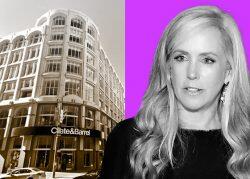A turnaround could be shaping up for San Francisco’s Union Square, and it appears to be linked to a recent gain on the return of workers to offices in the city, according to a report from JLL.
Initial pandemic shutdowns followed by the lengthy dearth of tourists, business travelers and office workers took a clear toll on San Francisco’s shopping mecca.
A rebound now looks to be gathering momentum, according to the brokerage’s recent report, titled “How Shoppers Have Returned to the City”. Foot traffic in Union Square doubled over the past year, according to JLL.. The report found that counts remain below pre-pandemic levels––around 35,000 pedestrians a day on average, according to various other sources. But only New York City’s Times Square has seen a bigger turnaround over the period, nearly tripling foot traffic in a boost helped along by the reopening of Broadway theaters as the area strives to reach its pre-pandemic levels estimated at 360,000 pedestrians per day.
Union Square’s foot-traffic improvement has dovetail with some recent high-profile arrivals to the area. Chanel paid $63 million for a three-story 18,000-square foot property on Post Street at the end of last year, and Australia-based Coco Republic recently announced that its first U.S. furniture store would be in 53,000-square-feet formerly occupied by Crate and Barrel on Stockton Street.
JLL linked the foot traffic increase to a return of office workers in the city, which saw only 17.4% back at their desks in mid-January, a time when the Omicron variant of Covid-19 was raging. By mid-April, 35.4% were in the office in San Francisco,, nearing the 43.3% percent average for 10 cities tracked by JLL, a roster that also includes San Jose, New York, Los Angeles, Chicago, Miami, Washington, D.C., Houston, Dallas and Austin.
Texas seems to be the leader on employees going back to offices, with Houston, Austin and Dallas all above 50% for in-person attendance.
“We’re almost halfway through 2022 and Americans are heading back to work,” according to the report. “Not at pre-pandemic rates, but cities are seeing significant increases in daytime workers, which is crucial for the urban retail rebound.”
The foot traffic trend is not limited to Union Square or the rest of San Francisco’s downtown. Hayes Valley— known for its proximity to City Hall, cultural venues and high-end boutiques and restaurants—saw foot traffic increase by 75% between April 2021 and April 2022, according to the report.
Dining out is another essential component to an urban rebound, according to the report, and San Francisco is making strides in getting customers back into the city’s famous dining scene. The number of seated diners was down 43 percent in April 2022 compared to pre-pandemic figures, compared with a nearly three-quarters reduction a year earlier. In the U.S. overall, counts of seated diners are only slightly off their pre-pandemic figures and some markets, such as Miami, are seeing increases.
“Between capacity restrictions, labor shortages and COVID-19 variant surges, food and beverage has been the industry hit hardest, but a full recovery finally feels within reach,” according to the report.
Read more


